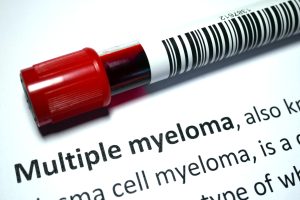
Understanding Multiple Myeloma Risk Factors
Multiple myeloma (MM) is a rare type of blood cancer that often develops without early symptoms, making awareness of risk factors essential. Regional Cancer Care
HIPAA Alert: Potential Data Breach Learn More
Questions on Oncology, Hematology and/or Infusion Clinical Services due to COVID-19 Crisis – CALL 833-698-1623
Important Information for Our Patients Regarding the Coronavirus.
RCCA Providing Area Cancer Patients with Access to Care During Coronavirus Outbreak
RCCA Offering Patients Virtual Visits During Coronavirus Pandemic
One of several gynecologic cancers, ovarian cancer starts in the ovaries, fallopian tubes or – rarely – in a membrane lining the abdominal cavity called the peritoneum. Cancer occurs when genetically mutated cells grow uncontrollably. As those cells grow, they can form tumors and eventually place pressure on normal tissue and impair physical function, causing pain and illness. At Regional Cancer Care Associates (RCCA), our team of highly experienced oncologists and hematologists provide comprehensive treatment for patients in New Jersey, Connecticut, Maryland, and the Washington, D.C., area who have various types of cancer, including ovarian cancer.
Approximately 21,000 women in the United States are diagnosed with ovarian cancer each year. While the majority of these women are over the age of 40, those age 60 and older are at elevated risk. There is a higher mortality rate with ovarian cancer compared to other gynecological cancers, and it is the eighth most common cancer reported in women.
There are three main types of ovarian cancer, which are classified by the types of cells in which the cancer starts to grow:
Women should stay informed about ovarian cancer and its symptoms. Early detection and treatment are key to achieving the best possible outcomes. Women should inform their healthcare providers about any family history of ovarian cancer or other types of cancer, have regular medical checkups, and discuss any physical changes, symptoms, and concerns with a primary care provider, Ob/Gyn, or other clinician.
There are a few known ovarian cancer risk factors, but other determinants of risk for the disease remain unclear. Characteristics that increase the risk for ovarian cancer include:
Other factors may lower the risk of developing ovarian cancer. These factors include experiencing full-term pregnancy before the age of 26, having undergone a hysterectomy or tubal ligation, and taking birth control pills.

Ovarian cancer is not detected with a single initial test. Rather, physicians rely on a combination of screening methods and assessments to identify potential cases of ovarian cancer and then conduct further evaluations based on their findings. Screening tests include:
As with other cancer types, early detection and treatment of ovarian cancer are key to achieving better outcomes. The five-year survival rate for those diagnosed with localized ovarian cancer (when cancerous growth has not extended outside the ovaries) is 93%. This percentage falls to 31% if cancer reaches distant organs.

While symptoms are not always present with ovarian cancer, particularly in its earlier stages, women experiencing any of the following should make an appointment with a medical professional promptly:
It is important to note that these symptoms may reflect a wide variety of conditions beyond ovarian cancer and that most women who, for instance, experience bloating or abdominal discomfort, will not have ovarian cancer. However, whatever their cause, these symptoms warrant timely evaluation and intervention, both to identify and treat serious conditions and to enhance quality of life.
A diagnosis of ovarian cancer usually requires a physical examination, imaging, and tissue biopsy. When determining the stages of ovarian cancer, doctors assign one of four stages to the disease. t Utilizing this framework, the oncology medical team draws on the latest research to determine which treatments are most likely to be effective.
Once the oncologists of Regional Cancer Care Associates determine the type and stage of ovarian cancer, they will recommend a personalized plan for ovarian cancer treatment. Multiple treatment methods may be used at the same time. The most common treatment options are:
Women with ovarian cancer may benefit from seeking support from loved ones and others. People and groups to rely on for coping with an ovarian cancer diagnosis include:
Besides ovarian cancer treatment, Regional Cancer Care Associates also offers resources for side effects management and similar guidance.
For patients who have been diagnosed with ovarian cancer, the caring oncologists and other medical professionals at Regional Cancer Care Associates are available to determine the best course of treatment and implement a personalized treatment plan. This experienced, compassionate team has the skills necessary to treat various cancer types and blood disorders. For more information on ovarian cancer and treatment options, contact us or visit one of our 25 convenient office locations throughout New Jersey, Connecticut, Maryland, and the Washington, D.C., area.
At Regional Cancer Care Associates (RCCA), we feature the best of modern oncologic medicine. We meet the highest standard of cancer care in both quality and safety. At the same time, we lead with our hearts, offering an environment characterized by compassion. We focus on you, individually, and work with you and your family to ensure your care is second to none.
For more information, please call (844) 346-7222. You can schedule an appointment by calling the RCCA location nearest you.

Multiple myeloma (MM) is a rare type of blood cancer that often develops without early symptoms, making awareness of risk factors essential. Regional Cancer Care

Why there’s never been a better time to schedule deferred mammograms, skin examinations, colonoscopies, and other potentially life-saving cancer screenings.

The American Cancer Society will host its 43rd annual Diamond Ball Gala on November 24, 2024, at the Westmount Country Club in Woodland Park, NJ.
When standard cancer treatments aren’t providing the results you want, clinical trials may offer hope. Our physicians use clinical trials to study new treatments, helping transform cancer care for the better. You can enroll in a clinical trial to try groundbreaking treatment plans at zero cost to you.

Regional Cancer Care Associates is one of fewer than 200 medical practices in the country selected to participate in the Oncology Care Model (OCM); a recent Medicare initiative aimed at improving care coordination and access to and quality of care for Medicare beneficiaries undergoing chemotherapy treatment.